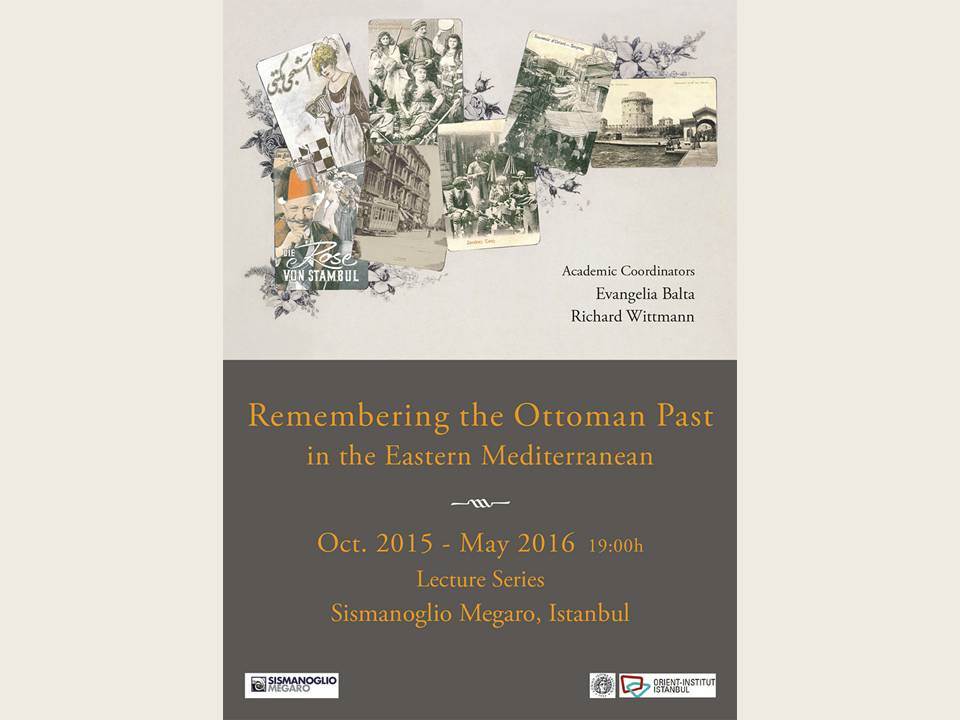
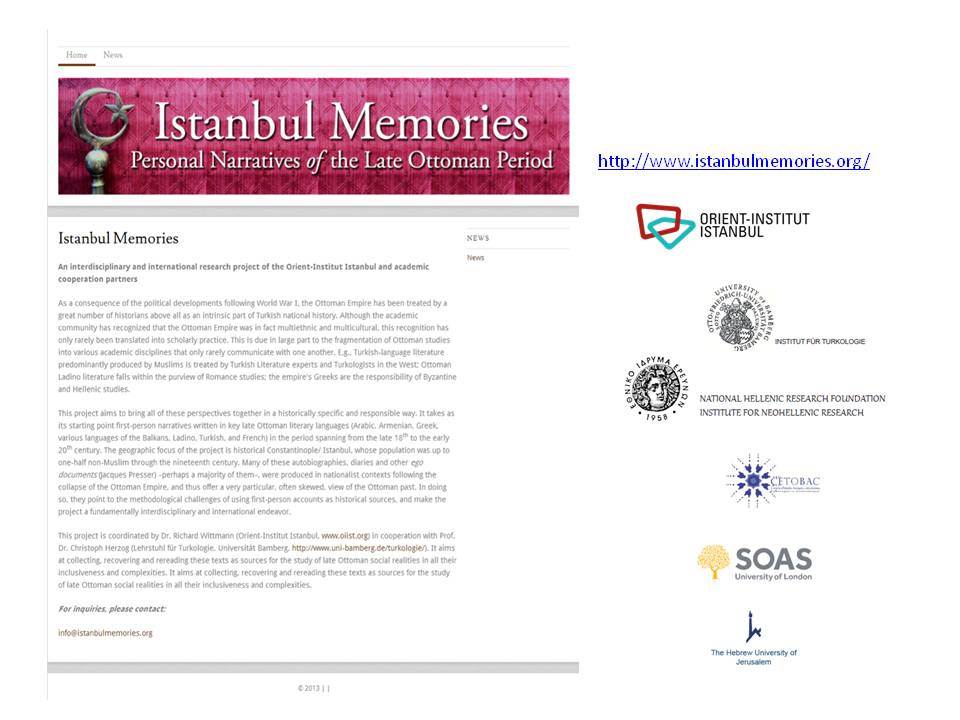
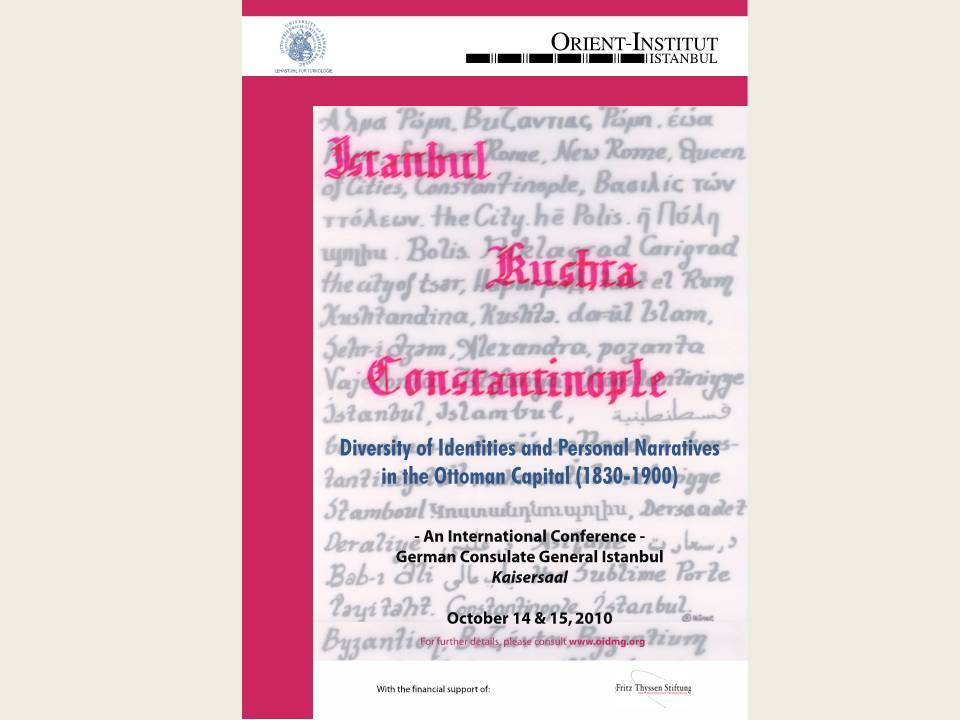

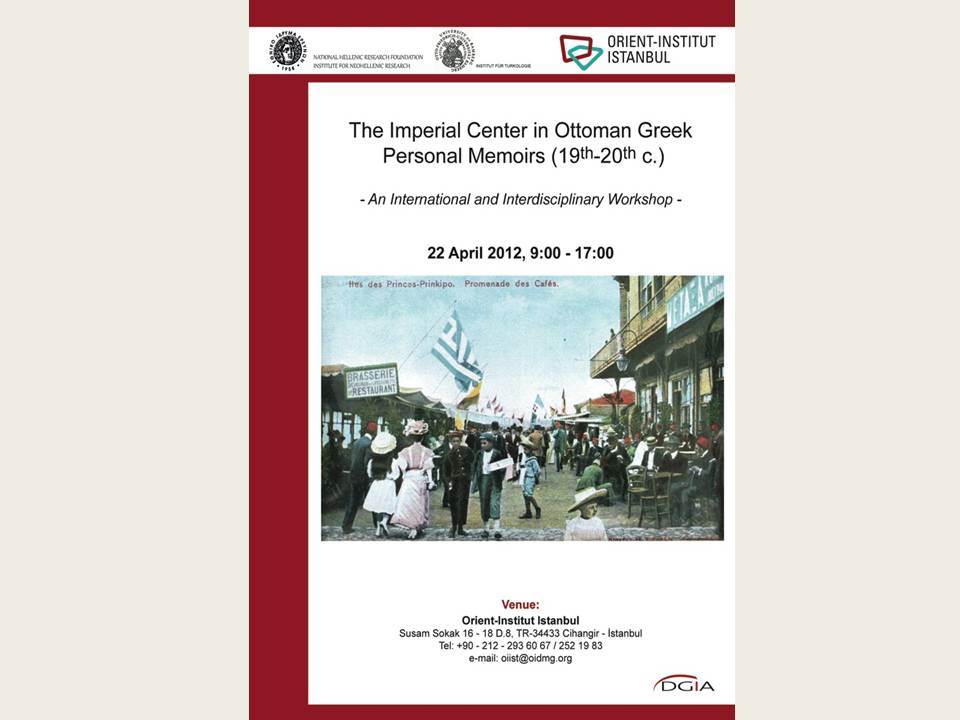
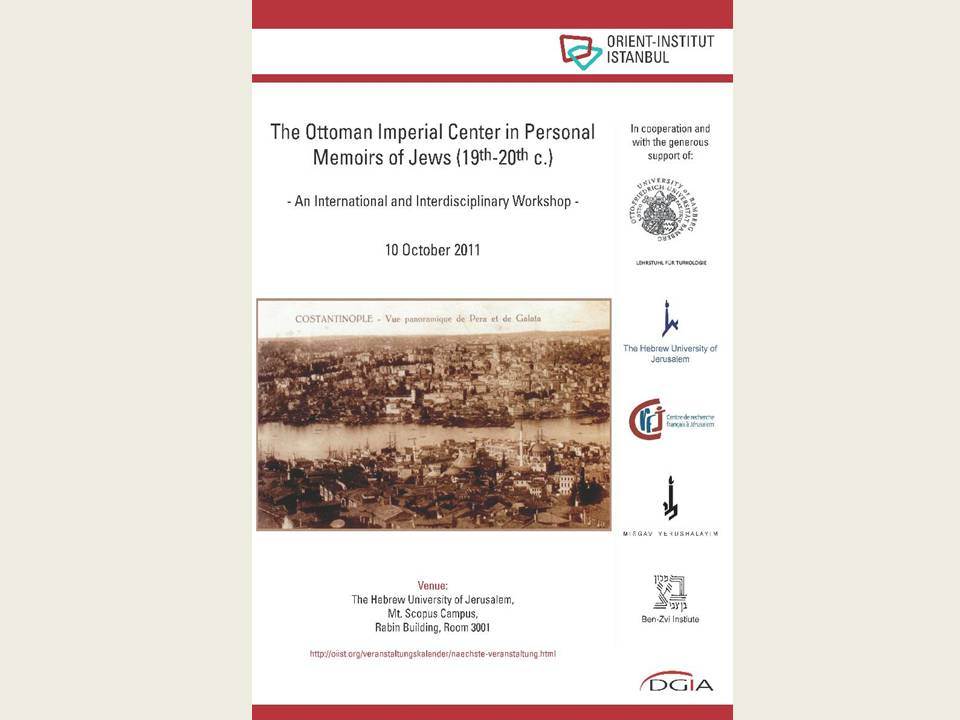
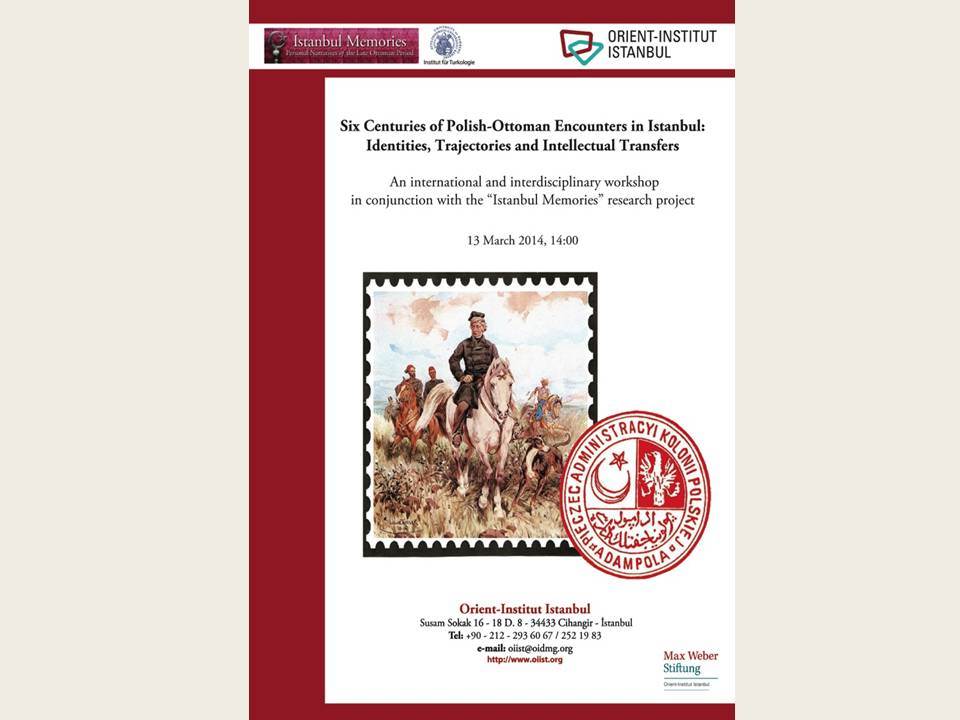
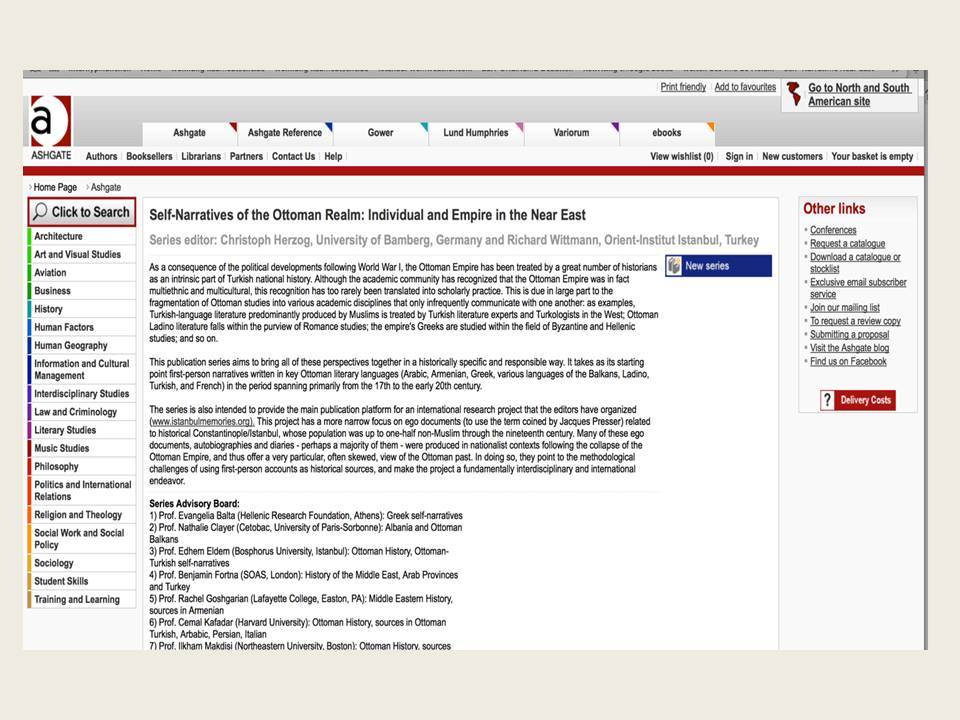
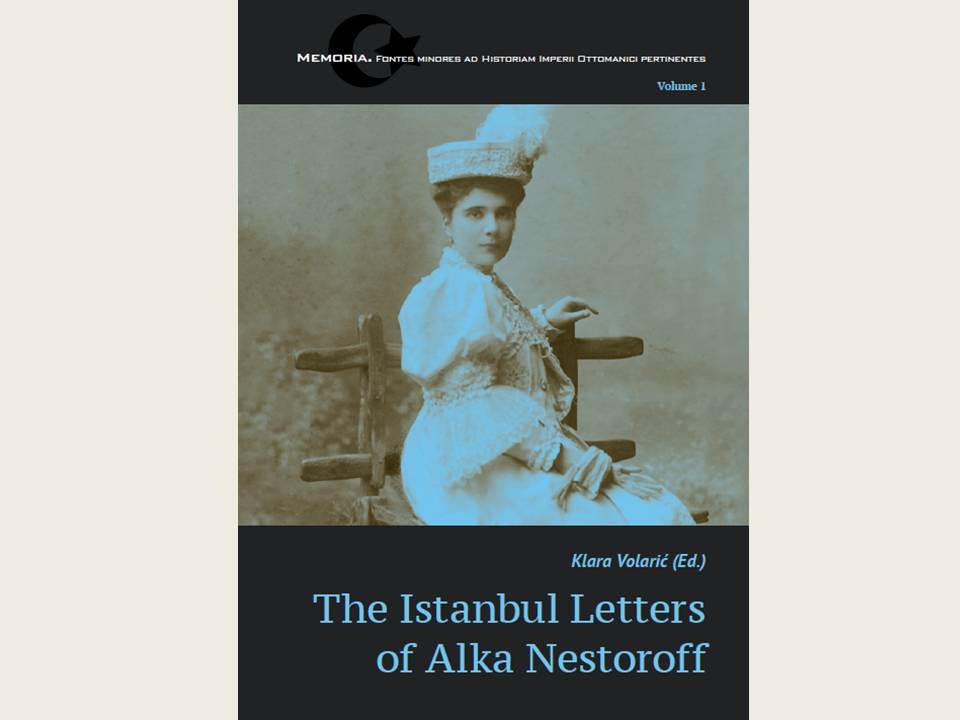
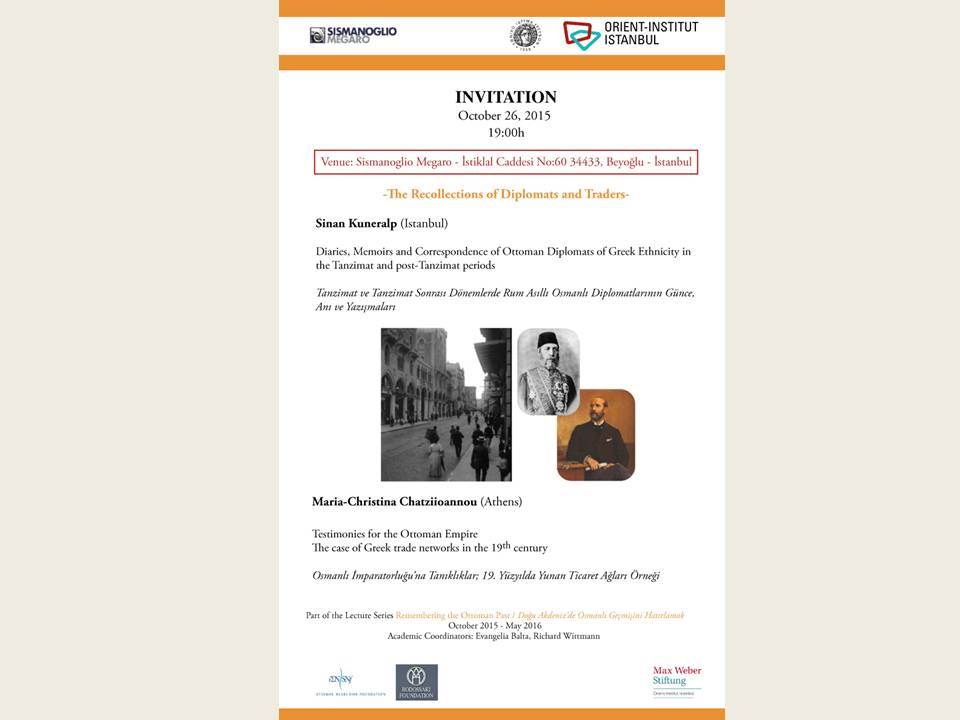
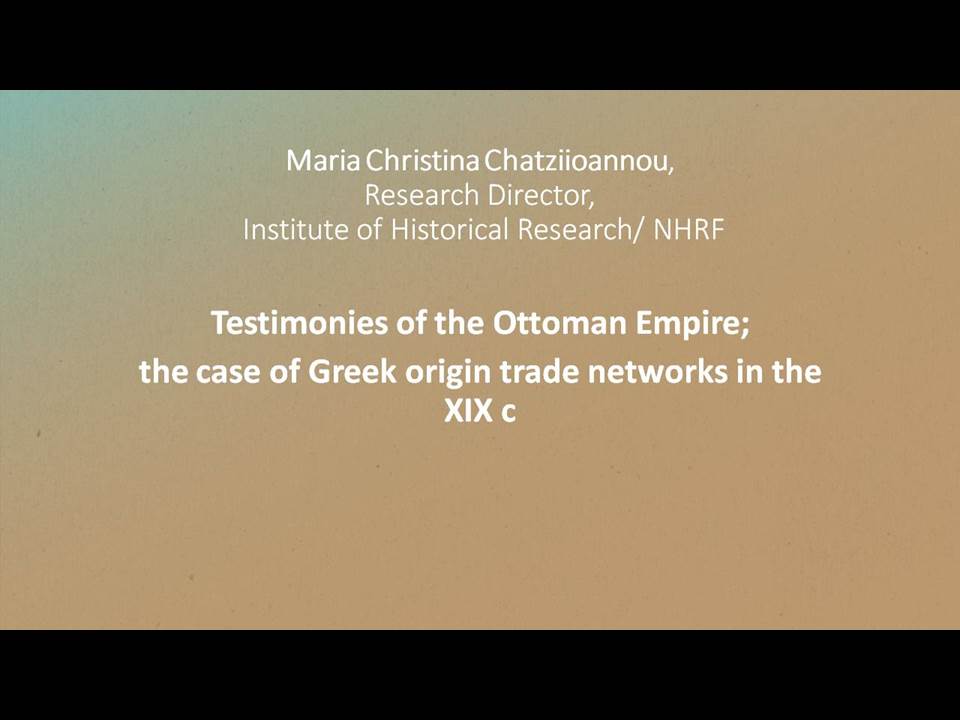
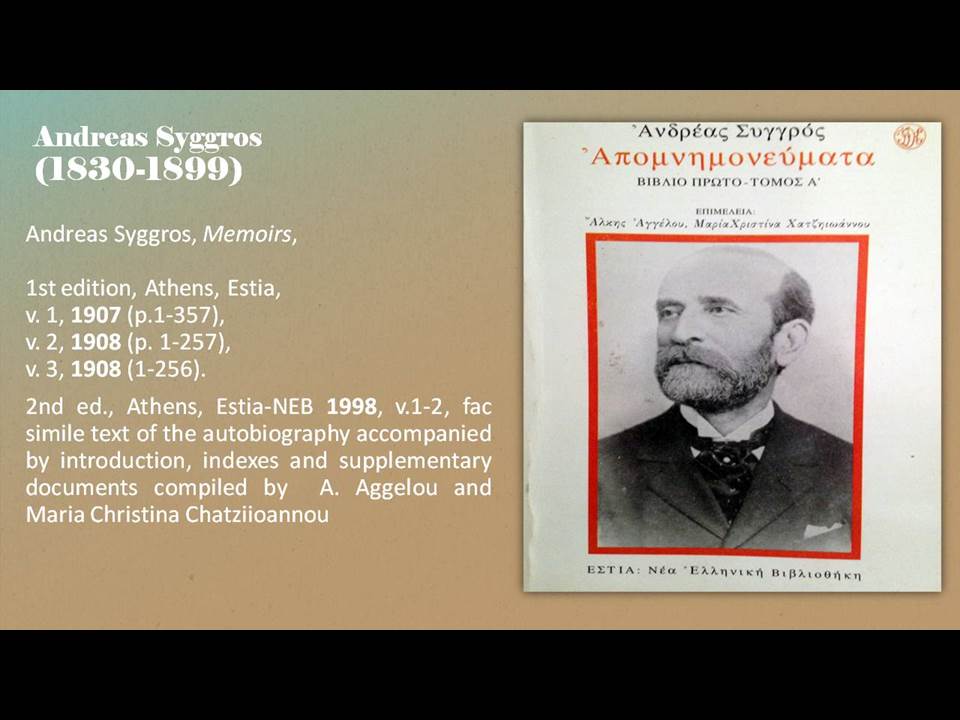
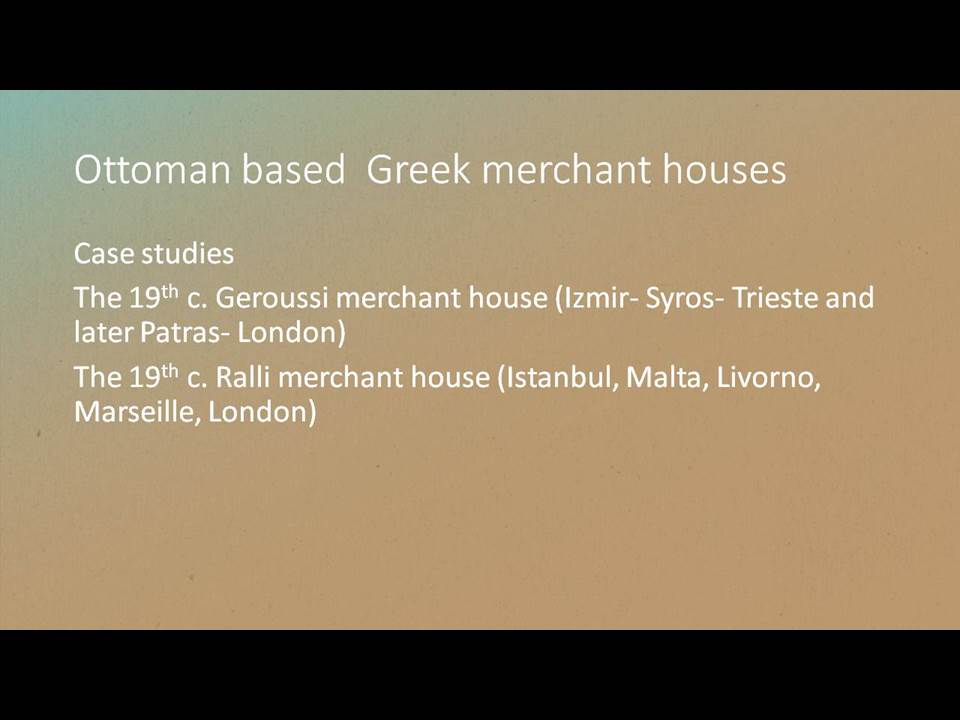
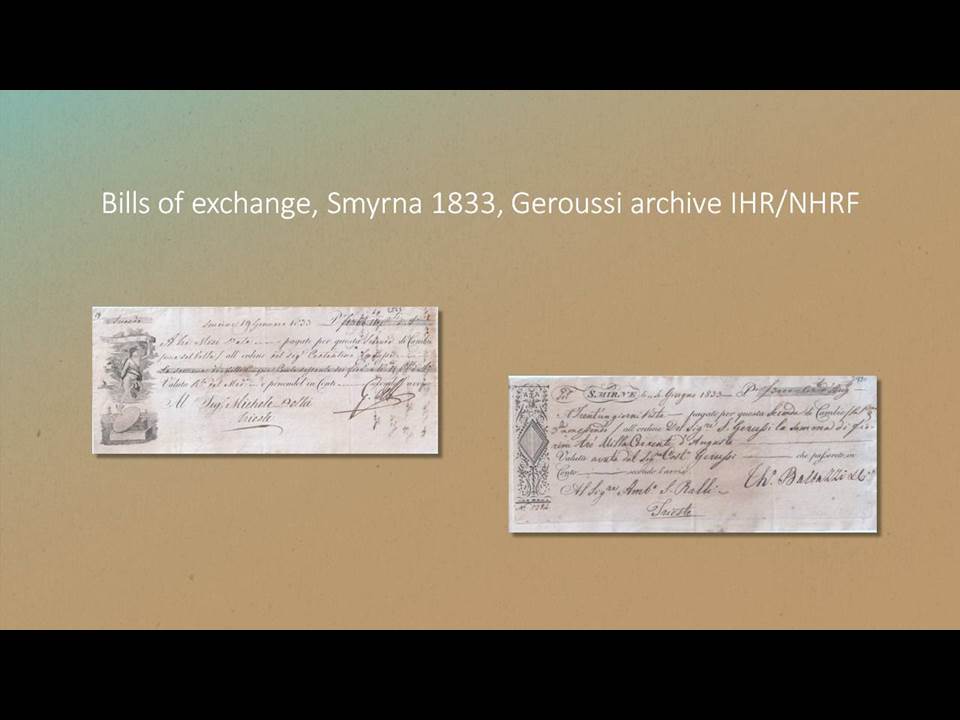
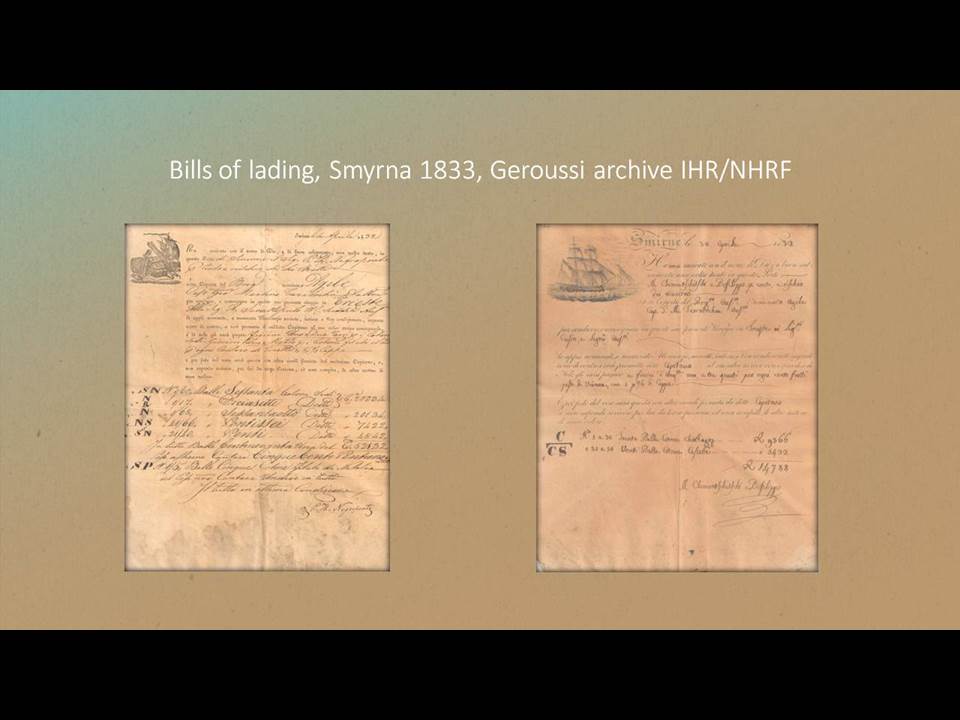
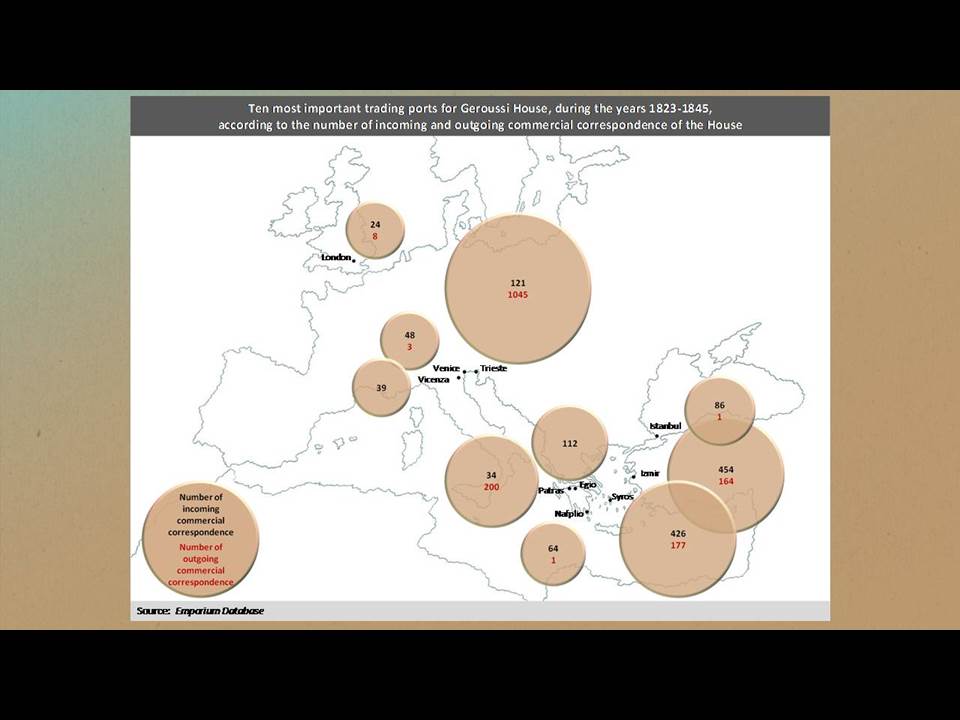
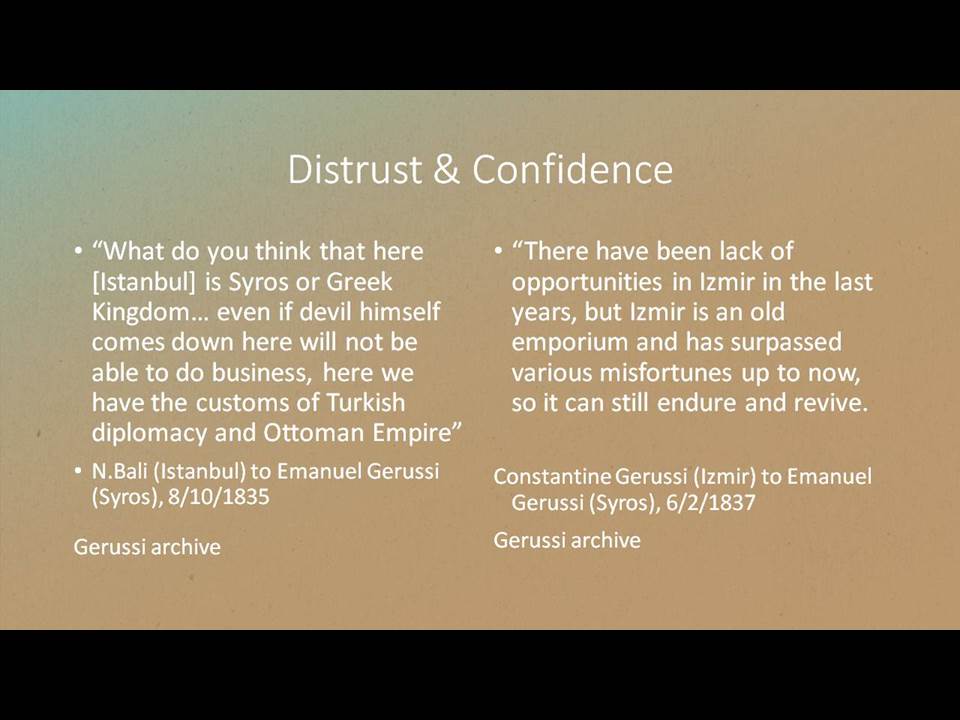
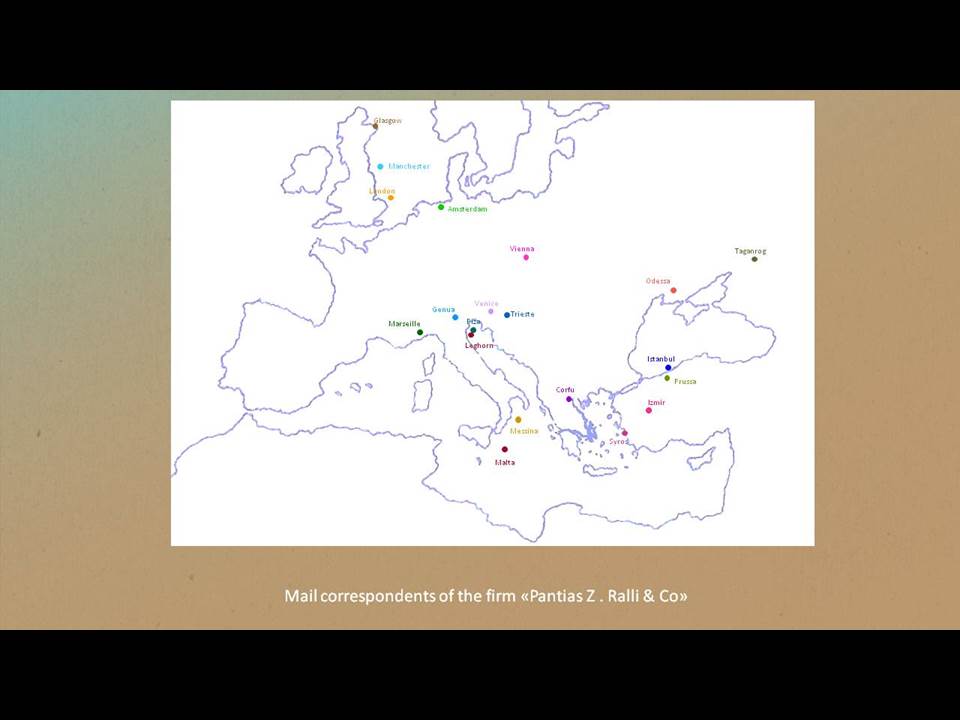
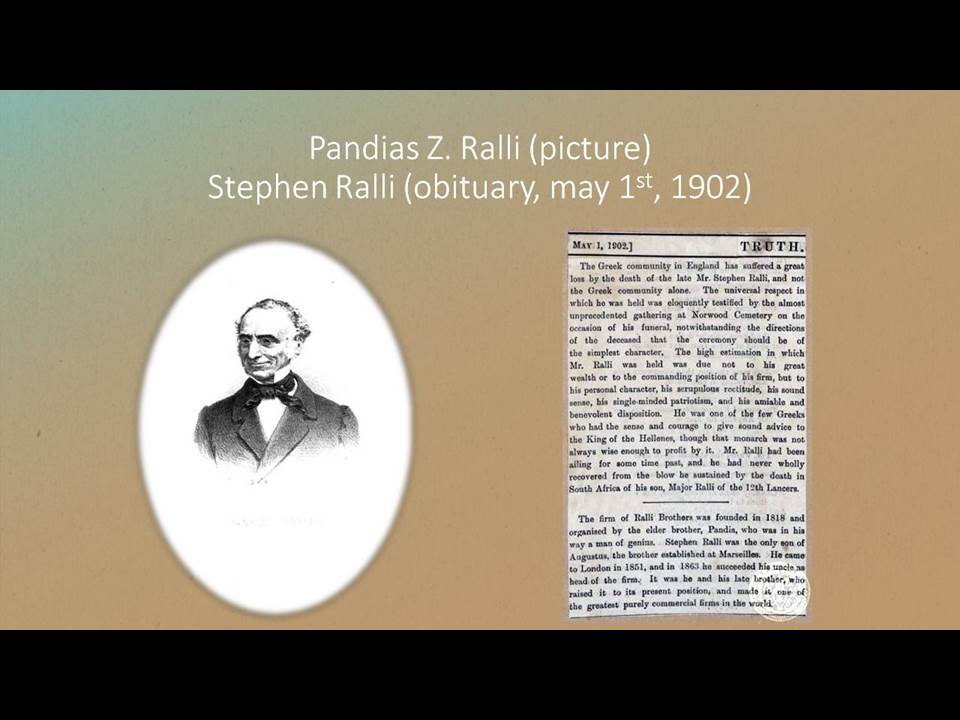
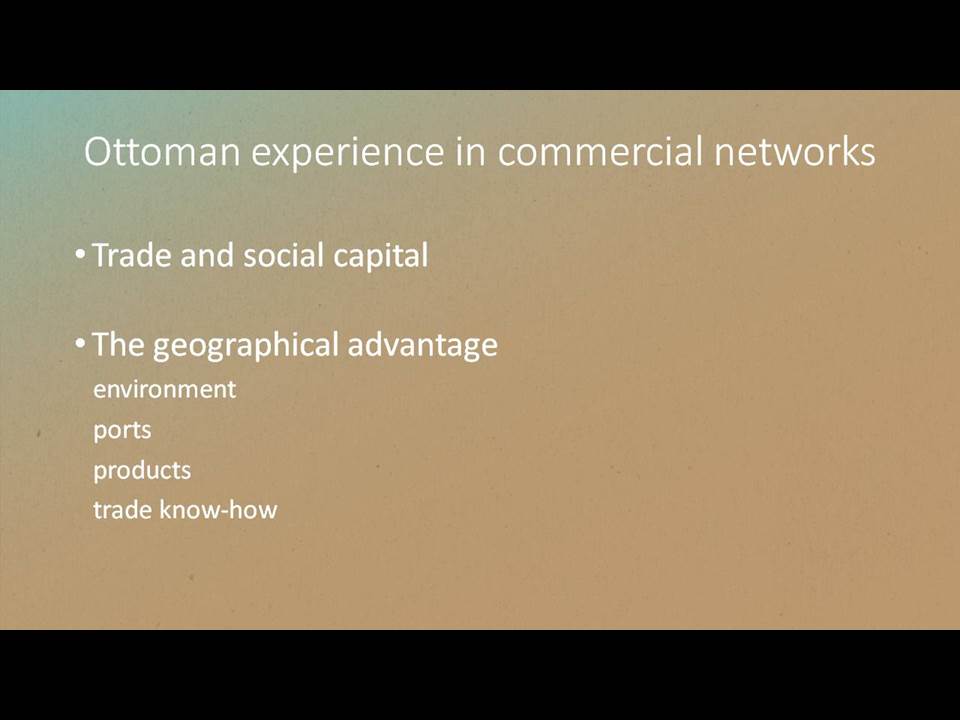
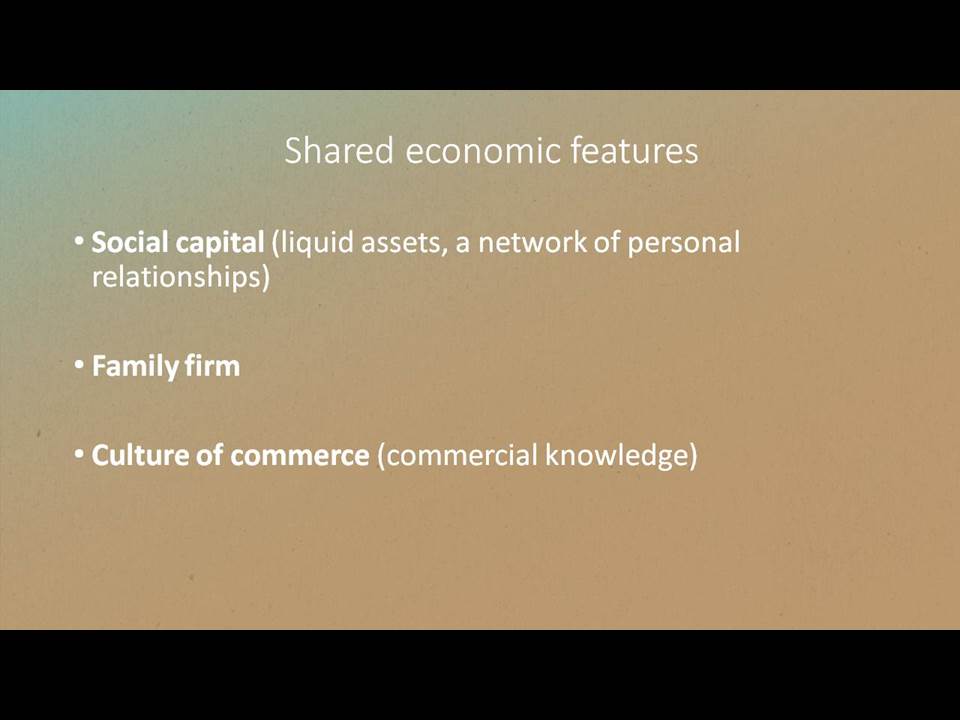
Wittmann Richard
Kuneralp Sinan
Chatziioannou Maria-Christina
Balta Εvangelia
Γλώσσα
Türkçe
Ημερομηνία
26/10/2015
Διάρκεια
01:27:36
Εκδήλωση
Sismanoglio Megaro konuşmalar
Χώρος
Sismanoglio Megaro, Istanbul
Διοργάνωση
Γενικό Προξενείο της Ελλάδας στην Κωνσταντινούπολη
Κατηγορία
Ιστορία
Yunanistan Ulusal Araştırma Enstitüsü Osmanlı Araştırmaları Programı ve Orient-Institut Istanbul işbirliğiyle Sismanoglio Megaro binasında “Doğu Akdeniz’de Osmanlı Geçmişini Hatırlamak” başlıklı bir konuşmalar dizisi düzenliyor. Ekim 2015 – Mayıs 2016 eğitim öğretim döneminde Sismanoglio Megaro’da Evangelia Balta (Program of Ottoman Studies, National Hellenic Research Foundation, Athens) ile Richard Wittmann’ın (Orient-Institut, Istanbul) birlikte düzenleyeceği bu konferans dizisi, Doğu Akdeniz bölgesindeki günümüz sakinlerinin ortak geçmişlerinin çeşitli yönlerine ışık tutmayı amaçlıyor. Bu konferans dizisi Orient-Institut Istanbul ile Program of Ottoman Studies at the National Hellenic Research Foundation’ın araştırma alanlarıyla örtüşmektedir. Osmanlı İmparatorluğu’nun yıkılışının sonuçlarıyla etkilerinin halen hissedildiği günümüzde, bu konferanslar hâkim tarihyazımının standart kurallarını ve sınırlarını zorlayan çok sayıda kaynağa odaklanmaktadır. Kişisel ve resmi yazılı kaynaklarının yanı sıra görsel ve sanatsal ifade biçimlerini de araştırma sürecine dahil eden bu dizi, bu geniş –ve yüzyıllar boyunca bir bütün olarak kalmış– coğrafi alanda yirminci yüzyılın ilk otuz yılındaki derin siyasi değişikliklere eşlik eden kopuşlara ve sürekliliklere bir ışık tutma denemesi olacaktır. Devamını oku: http://goo.gl/JDzkt4
“Hariciyeci ve Tüccar Hatıratı” başlıklı ilk konferansımızda Rum Ortodoks hariciye mensupları ile Rum tüccar ve işadamlarından kalan metinlere odaklandık. Konuşmacılarımız, günlükler, anı kayıtları ve yazışmalardan müteşekkil bir bütünden hareketle, Osmanlı tebaasının bu iki sınıfının yaşadıkları ve çalıştıkları dönemleri anlattılar. Sinan Kuneralp (İstanbul) ve Maria Haciyoanu (Atina), araştırmacılar için, ilgili dönemlere ait önemli bir tarihî kaynak işlevini haiz olan ve bilerek ya da bilmeyerek ölümsüzleştirilmiş bu külliyattan edindikleri bilgileri dinleyicilerimize aktardılar.
Sinan Kuneralp
Tanzimat ve Tanzimat Sonrası Dönemlerde Rum Asıllı Osmanlı Diplomatlarının Günce, Anı ve Yazışmaları
Özet
Rum asıllı dört aile son dönem Osmanlı hariciye hizmetinde tebarüz etmiştir. Aristarki, Karatodori, Mavroyeni ve Musurus ailelerinin ferdleri 1840lardan birinci dünya savaşına kadar önemli diplomatik görevlerde bulunmuşladır. Özel mektuplar, resmi yazışmalar, anı ve güncelere dayanarak, çokuluslu bir devlete sadakatla hizmet etmiş olan dini ve etnik bir ekaliyete mensub bu şahışların ruhsal ve düşünsel yapılarını incelenecektir.
Maria Christina Chatziioannou
Osmanlı İmparatorluğu Tanıklıkları: 19. Yüzyılda Yunan Asıllı Ticaret Ağları Örneği
ÖZET:
Osmanlı mirasının Yunan-Osmanlı müteşebbislerini şekillendirmedeki önemi açıktır. Buna rağmen, Osmanlıların hafızası farklı yorum ve algılara maruz kalmıştır. Burada temel mevzu, özel kaynaklarda (ticari belgeler ve hatıratlar) yer alan, tüccarların tarihinde ve hafızasında şekillendiği haliyle Osmanlı geçmişidir. "Osmanlı deneyimi" olarak tarif edilen bu tartışmada, ticaret ve sosyal sermayenin ve belirli aracıların çevreyle, limanlarla, ürünlerle ve ticari becerilerle aşina olmasına olanak sağlayan coğrafi avantajın, Akdeniz'in dahilinde ve haricindeki ticari ağları şekillendirmede yaygın olarak paylaşılan temel etmenler olduğunu iddia ediyoruz.
Τhe National Hellenic Research Institute (Ottoman Studies Programme) and the Orient-Institut (Istanbul) is to hold at the Sismanoglio Megaro a series of lectures titled “Remembering the Ottoman Past in the Eastern Mediterranean”. This joint series of lectures organized by Evangelia Balta (Programme of Ottoman Studies, National Hellenic Research Foundation, Athens) and Richard Wittmann (Orient-Institut, Istanbul), to be held at the Sismanoglio Megaro during the October 2015 – May 2016 academic year, aims to shed light on various aspects of the communal past of today’s residents of the Eastern Mediterannean region. This series of lectures is consistent with the research interests of the Orient-Institut Istanbul and the Programme of Ottoman Studies at the National Hellenic Research Foundation. It focuses on a large number of sources that go beyond the standard rules of established history-writing. By taking into account personal and official textual sources, as well as visual and artistic forms of expression, an attempt will be made to throw light on the rifts and continuities that accompanied the profound political reshuffling in this wide – and for centuries, unified – geographical area during the first third of the twentieth century. Read more http://goo.gl/cL5mVN
The first cycle of lectures titled "The Recollections of Diplomats and Traders" focused on the left by Rum Orthodox diplomats and Rum merchants and businessmen. Through the diaries, memoirs and correspondence, the era in which these two classes of Ottoman subjects lived and worked, was discussed. The two speakers, Sinan Kuneralp (Istanbul) and Maria-Christina Hadjioannou (Athens), informed our guests about an era that Rum diplomats and merchants either intentionally or unintentionallyimmortalized in the texts they left behind. Those texts are important historical and descriptive sources for the researchers.
Sinan Kunaralp speech
Diaries, Memoirs and Correspondence of Ottoman Diplomats of Greek Ethnicity in the Tanzimat and post-Tanzimat periods
Abstract
Four ethnic Greek families hold pride of place in the Ottoman foreign service: members of the Aristarchi, Karatheodory and Mavroyeni and Musurus families held many important diplomatic positions from the 1840s till the first world war. Based on private letters, official reports, memoirs and diaries, this paper will try to penetrate the psyche and identify the mindset patterns of these individuals from a religious and ethnic minority who loyally served a multi-national empire.
Maria Christina Chatziioannou speech
Testimonies of the Ottoman Empire. The case of Greek origin trade networks in the XIXth century
Abstract
The importance of the Ottoman legacy for shaping the Greek-Ottoman entrepreneurs is evident. However, the Ottomans' memory was subject to different interpretations and perceptions. Here the main issue is the Ottoman past as shaped in merchant’s history and memory through private sources (commercial archives and memoirs). We argue that the key factors in this debate described as the Ottoman experience, are: Trade and social capital, the geographical advantage enabling certain agents to be familiar with the environment, ports, products and trade know-how as fundamental principles widely shared or disseminated shaping commercial networks within and beyond the Mediterranean.
Richard Wittmann (Ph.D. in History and Middle Eastern Studies, Harvard University 2008) is the Associate Director of the Orient-Institut Istanbul. After studying Law, Islamic Studies, and Turcology at the University of Munich and at Freie Universität Berlin he was awarded a scholarship from Harvard University where he continued his studies at the Department of History and at the Center for Middle Eastern Studies.
His research interests focus on Islamic legal history and the social history of the Ottoman Empire. Special attention is given in his work to the consideration of self-narratives as historic sources for the study of the Near East.
Richard Wittmann coordinates an international collaborative research project aiming at the study and publication of Ottoman self-narratives (www.istanbulmemories.org). He is the editor of the publication series Memoria. Fontes Minores ad Historiam Imperii Ottomanici Pertinentes (www.perspectivia.net/publikationen/memoria) and (co)editor of the monograph series Self-Narratives of the Ottoman Realm: Individual and Empire in the Near East (Farnham: Ashgate).
Sinan Kuneralp 1983 yılından beri İsis yayınlarını yönetmektedir. Kendi araştırmaları son dönem Osmanlı imparatorluğunun diplomatik ilişkileri üzerine yoğunlaşmaktadır. Hedefi 1839-1914 arası dönem için Osmanlı Hariciye Nezareti belgelerine dayanarak Şark meselesine "Şark'tan bir bakış" getirmek.
Sinan Kuneralp has been running the Isis Press since 1983. His personal field of research is late Ottoman diplomatic history. He is engaged in writing a history of the Eastern Question as seen from the East, using diplomatic reports from the Ottoman Ministry of Foreign Affairs.
Doktorasını 1989 yılında modern tarih dalında Milli Capodistrian Üniversitesi’nden alan Maria Christina Chatziioannou aynı okulda tarih (1973-1979) ve Roma’daki Sapienza Üniversitesi’ne bağlı Scuola di Perfezionamento di Storia e Mediovale e Moderna’da İtalyan tarihi (1978-1980) okudu. Şimdilerde Tarihsel Araştırma Enstitüsü ve Milli Helenik Araştırma Vakfı’nda araştırma yöneticisidir. Chatziioannou, Atina ve Girit Üniversiteleri ile EHESS’te toplumsal ve iktisadi tarih alanlarında lisans ve yüksek lisans dersleri verdi. 2010-2014 yılları arasında Yunan İktisadi Tarih Derneği’nin başkanlığını yürüttü. Ticaret odaları, müteşebissler, ticari ağlar, perakendecilik, Yunan yerleşimlerinin tarihi ve İtalyan tarihyazıcılığı (18-20. yüzyıllar) hakkında yayınlar yaptı.
http://www.eie.gr/nhrf/institutes/inr/cvs/cv-chatziioannou-en.pdf
Maria Christina Chatziioannou, (PhD. Modern History 1989, Department of History and Archeology-National Capodistrian University), studied History at the same university (1973-78) and Italian history at the Scuola di Perfezionamento di Storia Medioevale e Moderna, Universita di Sapienza, Rome (1978-80). She is Research Director at the Institute for Historical Research/ National Hellenic Research Foundation. She has taught graduate and undergraduate courses on social and economic history at the Universities of Athens, Crete and the EHESS. She is president of the Greek Economic History Association (2010-14). She has published on merchant houses and entrepreneurs, commercial networks, retailing, history of Greek settlements, Italian historiography (18th-20th c.).
http://www.eie.gr/nhrf/institutes/inr/cvs/cv-chatziioannou-en.pdf
Εvangelia Balta was born in Kavala in 1955. She studied in the History Department of the Aristotle University of Thessaloniki (1973-1977) and, thanks to a scholarship from the Alexandros S. Onassis Public Benefit Foundation, went on to study at the Sorbonne (Paris I-Sorbonne) and the Ecole Pratique des Hautes Etudes IV Section in Paris (1980-1983). She received her doctorate in Ottoman History in 1983. She worked in the Historical Archive of Macedonia (Thessaloniki, 1979), at the Centre for Asia Minor Studies (1978, 1984-1987) and taught at the Ionian University during the first two years after its foundation (Corfu, 1985-1987). Since 1987 she has worked at the National Hellenic Foundation for Scientific Research.
Her interests revolve around subjects related to economic and social history during the Ottoman period, as well on the history of Hellenism in Asia Minor. In addition to her commitment to various programs at the National Hellenic Research Foundation, she has also served as a scholarly advisor for the Museum of the Olive and Greek Olive Oil in Sparta, the Museum of Industrial Olive-Oil Production in Lesvos, and the Museums of Wine at the Ktima Hatzimichalis and the Ktima Gerovassiliou (Epanomi). She was academic supervisor for the restoration of the Kayakapi neighborhood (Project Kayakapı) in Ürgüp, Turkey (2003-2008). She has been invited to teach seminars for groups of graduate students by universities in Greece and abroad. Since 2011 she has taught at the Intensive Ottoman and Turkish Summer School held by Harvard University's Department of Near Eastern Languages and Civilizations (Cunda Adası-Ayvalik). She is a founding member of the planning committee of ΟΙΝΟΝ ΙΣΤΟΡΩ (History of Wine), a scholarly group which has organized seven conferences on subjects related to wine and wine production (2000-2008). Since 2008 she has organized Ιnternational Conferences on Karamanlidika Studies. She is a member of editorial committees in historical journals in both Greece and Turkey.

